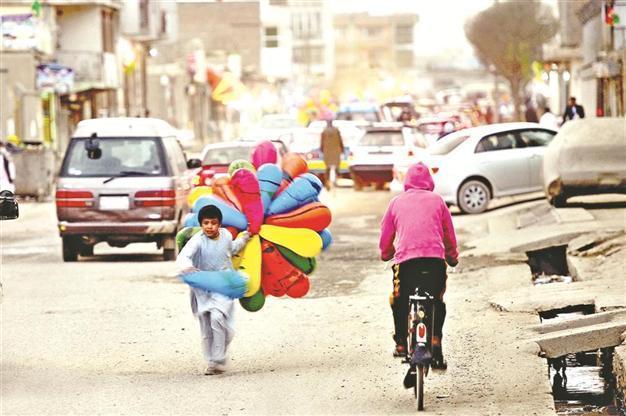Present global threats: Crime, poverty, terror
President of the Republic of Albania Bujar NISHANI

A young Afghan balloon seller runs towards a customer on a street in Kabul. Some nine million Afghans are living in ‘absolute poverty,’ the UN says. AFP photo
Ever since NATO was established in 1949, the Soviet Union used to be viewed as the main threat to the freedom and independence of Western Europe. As a result during the Cold War, the main mission of the alliance was to defend its members from the threats of Soviet Union and the Warsaw Pact.
The policies and structures of the alliance were transformed after the Cold War and adapted to the change of Europe’s new political and security environment with the appearance of new threats against it.
The North Atlantic alliance at present is spread all the way to its former opponents. The central role of NATO throughout this process has been strengthened in guaranteeing the security of the Euro-Atlantic zone. The NATO transformation during the last decade has been characterized by a series of initiatives coming as a concrete response to the security challenges that arose after the Cold War by enhancing the cooperation and partnership of an alliance that is now considered to be a political and military organization. These include: the Partnership for Peace; separate relations with Russia and Ukraine; dialogue with Mediterranean countries and effective cooperation on security with the European Union, Organization for Security and Co-operation in Europe (OSCE) and the United Nations.
‘UN reform should play great role’NATO has been engaged in operations outside the Euro-Atlantic area when it has been necessary to fight against international terrorism and other new threats, regardless of where they might come from. In order to improve its capacity in undertaking new missions, NATO is adapting and strengthening its capabilities. The Prague Summit of November 2002 to serve this scope took three key initiatives: establishing a NATO Reaction Force; reforming the military command structure and Prague Capabilities Commitment through which the voids in capacities would be faced by the individual engagements of member countries and cooperation initiatives.
The United Nations Organization feels the need for deeper reform to become more operational in fulfilling its mission in this dynamic world filled with challenges and threats on a global scale.
This reform must also keep in mind the increasing claims to be heard more and to play a greater role in the world stage – claims originating from countries that have upgraded their profiles in the international community.
The present global threats, such as organized crime, poverty and terrorism are interconnected and present a universal threat. Security, development and human rights are interconnected as well. Multilateralism has become more important in the face of such global threats like terrorism and weapons of mass destruction. Very powerful countries feel unimmunized and even vulnerable when faced with the asymmetric dangers of global effects. Such a situation has brought on cooperation among countries that could not have been imagined before and has increased the relative weight of importance and responsibility of each country, regardless of its size.
The grave economic crisis, whose effects have affected the whole globe and whose end is nowhere near in sight, has conditioned on a large scale the public deficits and as a consequence, the funds in the field of defense and intelligence. It has also forced the affected countries to turn their heads and pay more attention to their domestic problems.
In conclusion, it seems the United States of America still possesses the economic, military, political and diplomatic capabilities to be world leaders at a time when other countries are strengthening and different threats have appeared. It remains to be seen whether the Americans will continue to possess the right willingness and desire to harmonize their interests with those of partner countries and have the necessary capabilities to keep on playing such a role in the future as well.
